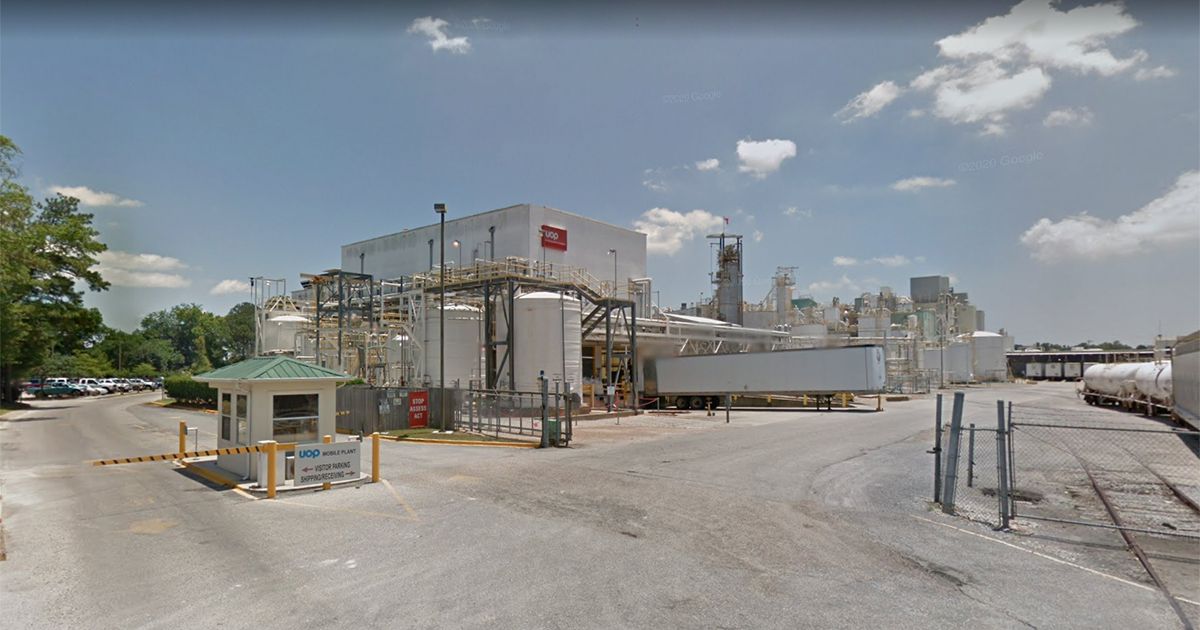MOBILE, Ala. (May 12, 2022) — The U.S. Environmental Protection Agency is granting key parts of a petition filed by GASP objecting to an air permit issued by the Alabama Department of Environmental Management (ADEM) to UOP, LLC in Mobile. The chemical manufacturing facility, which straddles the municipalities of Mobile and Chickasaw, is located within the historic Africatown Planning Area of Mobile.
GASP, Mobile Environmental Justice Action Coalition, Africatown-C.H.E.S.S., and the Deep South Center for Environmental Justice initially submitted comments on the Title V permit renewal to ADEM in 2020. GASP filed a petition to object to the permit on April 2, 2021 after the agency largely ignored the deficiencies noted in those comments. The EPA’s decision overrules ADEM, revoking the air permit it issued for the UOP plant.
UOP is owned by Honeywell International. The facility produces synthetic materials that are used as adsorbents and catalysts in various industrial applications, including petrochemical production and refining. The facility is a major source of air pollution that threatens public health. Pollutants of concern include particulate matter (PM), carbon monoxide (CO), and nitrogen oxides (NOx).
The UOP Mobile Plant is located within Alabama’s “chemical corridor” — a 60-mile stretch of land in Mobile County that is home to at least 28 industrial facilities. Mobile County ranks first for toxic releases in Alabama, and the UOP Mobile Plant is the fourth largest contributor to all air releases in the county. Air pollution released by the UOP facility burdens nearby residents who are disproportionately Black or low income.
In addition to revoking ADEM’s permit decision, EPA also ordered ADEM to show the past record of restrictions it set on UOP’s operations that allow the plant to escape major source permitting and be classified as a synthetic minor source. That classification means UOP was previously subject to less stringent regulations than it would have been under a Title V permit.
Statements from organizational representatives and community leaders:
“Thanks to the input of our frontline partners — MEJAC and CHESS — we were able to identify serious problems in ADEM’s proposed decision to issue the air permit for the UOP facility. The parts of our Petition that EPA granted that are most impactful are EPA requiring ADEM to adequately respond to comments raised about additional monitoring, recordkeeping and reporting for the opacity, PM and SO2 limits to assure compliance with hourly emission limits.” — Haley Lewis, Senior Staff Attorney, GASP
“We have a right to clean air. ADEM’s permit to UOP violates this right for children and adults in our area. I’m glad that EPA listened to us and overruled ADEM.” — Joe Womack, President/CEO, Africatown-C.H.E.S.S.
“The monitoring, recordkeeping, and reporting requirements coming out of ADEM are inappropriate for such large polluting facilities in urban communities – especially near homes, schools, and places of worship. EPA granting in part the Petition to Object to UOP’s air permit confirms the lived experiences of fenceline communities in Chickasaw, Prichard, and Africatown, near this refinery.” — Ramsey Sprague, President, Mobile Environmental Justice Action Coalition
“I know that I’m happy that the EPA is providing a second look at these sorts of permits that are detrimental to public health. The status quo hasn’t been acceptable for us who live near these plants. We’ve had no say. We’ve just been dumped on for so long. This gives me hope for the future of my neighborhood.” — Ruth Ballard, lifelong resident of Africatown
“Further, EPA’s decision requires ADEM to tell the public where they can find information they rely on in their permitting decisions – no more hiding essential information from the public.” — Sara Laumann, Attorney, Laumann Legal and outside counsel to GASP
“Permitting decisions are technically complex and already challenging for communities to understand. But as EPA’s order shows, even the experts can’t decipher ADEM’s permit record. The CU Law Clinic is honored to have helped GASP and impacted communities advocate for meaningful participation in decisions that affect their health and environment. This order is an important step towards seeing environmental justice in Mobile County.” — Jonathan Skinner-Thompson, Associate Clinical Professor, Colorado University–Boulder Environmental Justice Law Clinic
###
GASP is a nonprofit organization with a mission to advance healthy air and environmental justice in the Greater-Birmingham area and throughout Alabama via education, advocacy, and collaboration. GASP strives to reduce air pollution, to educate the public on the health risks associated with poor air quality and to encourage community leaders to serve as role models for clean air and clean energy development. gaspgroup.org


